Review of Harry Potter and the Prisoner of Azkaban
Review Harry Potter and the Prisoner of Azkaban
by Christopher G. Nuttall
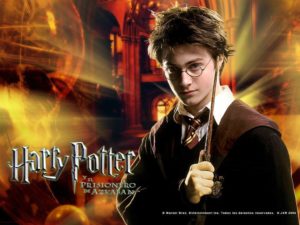
The third book in the Harry Potter series marks the start of a shift from single-volume adventures to a story arc that will dominate the remainder of the series, as it will no longer be possible to pick up a later book without reading the earlier ones. It also, on a more personal level, marks the moment when I gave up on the movies completely. There were several reasons for this, but perhaps the most important is the constant degradation of Ron Weasley, which gave birth to uncounted and uncountable Ron-bashing fan-fictions. Ron’s moment of glory is not removed from the movie, unlike the potions challenge all the way back in the first book, but instead is given to Hermione. Given that Ron is my favourite of the trio, and the only one who had a complete character arc, this did not sit well with me.
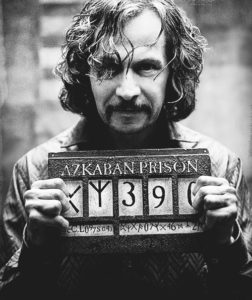 After a brief series of misadventures, including accidentally hexing his uncle’s sister, Harry Potter returns to Hogwarts. But all is not well. Sirius Black, the man who supposedly betrayed Harry’s parents to Voldemort, has escaped from an inescapable prison and is heading straight to Hogwarts, apparently to finish what the Dark Lord began. In the meantime, their new teacher – Remus Lupin – is hiding a deadly secret, Draco Malfoy is trying to get one of Hagrid’s beasts put down, Professor Snape is in a very bad mood (what’s new?), the sinister guards of Azkaban are surrounding the school and Ron’s rat is sickly, apparently on the verge of death. Oh, and Harry keeps seeing the Grim – a very large dog, an omen of death – everywhere.
After a brief series of misadventures, including accidentally hexing his uncle’s sister, Harry Potter returns to Hogwarts. But all is not well. Sirius Black, the man who supposedly betrayed Harry’s parents to Voldemort, has escaped from an inescapable prison and is heading straight to Hogwarts, apparently to finish what the Dark Lord began. In the meantime, their new teacher – Remus Lupin – is hiding a deadly secret, Draco Malfoy is trying to get one of Hagrid’s beasts put down, Professor Snape is in a very bad mood (what’s new?), the sinister guards of Azkaban are surrounding the school and Ron’s rat is sickly, apparently on the verge of death. Oh, and Harry keeps seeing the Grim – a very large dog, an omen of death – everywhere.
Eventually, they discover that Remus is a werewolf, Sirius Black is innocent and the real betrayer was Peter Pettigrew, who has been hiding out as a rat for the last ten years. Ron and Percy’s rat. (Make of that what you will.) There is a brief confrontation, followed by Pettigrew’s successful escape (but owing a life debt to Harry), Sirius’s escape from custody and Harry’s realisation that he has a godparent. And then he goes back – once again – to his aunt and uncle.
In some ways, Harry Potter and the Prisoner of Azkaban is Rowling at the top of her game. The story is neatly plotted, even if elements do not stand up to close examination, and all of the threads are tied up at the end. We learn more about the past, from Professor Snape’s relationship with James Potter and his three friends to just what happened on that fateful night when James and Lily Potter were killed. We also learn, once again, that the Wizarding World’s sense of justice is very poor. Sirius Black was not even given a trial before they locked him up and threw away the key.
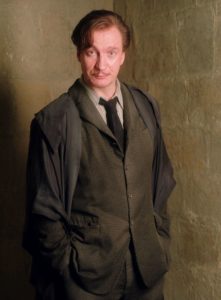
What is Professor Lupin hiding?
But perhaps that is not surprising, because Sirius Black was a bully of the very worst kind. The ‘Werewolf Caper,’ in which the young Sirius sent the young Severus Snape into a confrontation with a transformed Remus, was – at best – an attempt at outright murder. Indeed, it might have been a double murder: Remus would have been executed, I suspect, if he’d killed a student. (And Snape might even have killed Remus in self-defence.) In hindsight, it is clear why no one bothered to look too closely before sentencing Sirius to life imprisonment. Dumbledore had every reason to cover the whole story up – he is depicted as being astonishingly progressive by allowing Remus to attend at all – but you can bet he remembered.
Indeed, it is interesting to see how many weaknesses, amongst the new characters, are easy to see if you look at them carefully. Sirius is impulsive, rather than thoughtful; he lets himself be trapped, then arrested, because he doesn’t think before he runs into the fire. (And this will eventually get him killed.) Remus, by contrast, is a smiling coward, a man who says nothing about Sirius Black’s secret when everyone, Remus included, believes that Sirius is a murderer intent on murdering Harry. Worse, perhaps, Remus is careless. He didn’t take his potion, resulting in a werewolf rampaging on the grounds that could also have gotten someone killed. Remus blames Snape for revealing his secret, and forcing Dumbledore to let him go, but I cannot help wondering if Remus was summarily fired. He was grossly careless and only sheer dumb luck kept someone from being hurt.

Ron and Scabbers (aka Peter Pettigrew)
Peter Pettigrew, in many ways, represents a character who turned out to be less significant than I had thought. And yet, reading between the lines, we see a far more complex – and dangerous – character than a mere snivelling coward. Peter managed a complex piece of magic at fifteen (none of the main characters even try to seek out their animal forms), something that should prove that he is far from inept. He also lured Sirius into a trap, presumably with the intention of killing him, and hid out for a decade afterwards. But he also betrayed the Potters. Was he really convinced that Voldemort was going to win? Or did he have personal reasons to hate James or Sirius? I wouldn’t be too surprised if young Peter wasn’t a little wary of his ‘friends.’ Boys like that can turn on their comrades if there’s no one stronger to bully.
But Peter – and Sirius – are clear proof that Slytherin is not the only house that produces dark wizards (or at least evil wizards). Harry should have seen that, as soon as he worked out that Sirius was a Gryffindor, but – again – Harry is remarkably incurious about his world. It grows more and more frustrating, with every book, that Harry doesn’t try to find things out for himself. Instead, he relies on Hermione and Ron to tell him things, while Dumbledore spoon-feeds Harry what he thinks Harry needs to know. If nothing else, Harry should have realised just how little actual justice there is in the Wizarding World.
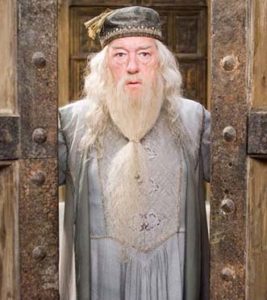
Dumbledore, secretly evil? Or absendminded?
Dumbledore himself comes off as a far darker character in this book, although he has not yet plunged the depths of depravity in his desperate bid to defeat Voldemort. Specifically, his response to the Werewolf Caper. Faced with an attempted double-murder, Dumbledore did not expel the person responsible (Sirius) or tighten up his pitifully weak security precautions; instead, he forced everyone involved to keep quiet about the affair. It is no longer possible to question why Snape went to the Death Eaters. Indeed, it is hard to blame Snape. The true miracle is that he realised he’d made a mistake (Voldemort being even worse than Dumbledore at earning loyalty) and went back.
Indeed, Dumbledore compounds his error in hiring Remus with hiring Hagrid as the Care of Magical Creatures teacher. Hagrid is a huge half-giant, with an understandably different sense of what’s dangerous and what isn’t than a tiny schoolchild. Bringing them close to a handful of very dangerous – and prideful – creatures was stupid, all the more so as Hagrid works at a school and should know that teenagers can be bloody idiots at times. Indeed, neither Hagrid nor Remus show anything like the kind of safety awareness shown by Professor Snape (which is still pitifully thin compared to our safety rules). It was only a matter of time before something happened. And while Draco overreacted to the whole affair, it could easily have been a great deal worse.

Harry meets Buckbeak in Care of Magical Creatures Class
It’s also interesting to see, in the background, the signs that Dumbledore’s influence is steadily collapsing. Dumbledore could not keep the Ministry of Magic from sending the Azkaban Guards to Hogwarts, nor could he convince them that Sirius was actually innocent (unless you believe that Dumbledore deliberately stalled in hopes of keeping a rogue element off the chessboard). Rowling tied up most of the loose ends in Harry Potter and the Prisoner of Azkaban, but she left some threads for us to see later.

Hermione stealing Ron’s limelight
Going back to the trio, the book also gives both Hermione and Ron a chance to shine. It is Hermione who figures out the truth about Remus, while Ron – injured and defenceless – stands up to a man he has every reason to believe is a murderer; it is Hermione who nearly works herself to the bone by using a time-turner to attend several classes at the same time (a plot device that largely vanishes from the series after this book), while Ron chooses an easy class rather than something harder (although Ron isn’t too far wrong, as a single exam pass in Year 5 is enough to get the right to carry a wand). The book showcases both their strengths and weaknesses.
It also has creepier moments for the adults. Peter Pettigrew spent ten years hiding out at the Burrow, pretending to be a rat. Ron even let him sleep on his bed. In hindsight, the rat’s very longevity should have been a surprise. Rats don’t live that long. (What makes this worse is that Dumbledore didn’t tell anyone (nor did Ron) about the rat until Order of the Phoenix, which lets Peter help Voldemort make an absolute fool out of Percy. Peter spent years in Percy’s company. Of course he knows how to manipulate someone who has no idea he should be on his guard.
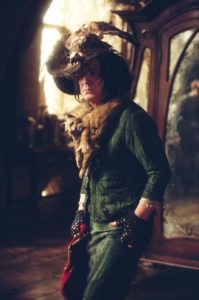
Neville fights a boggart by ridiculing Snape
Indeed, the whole scene with the Boggart is terrifying. Remus deliberately exposed the vast majority of the class to each other’s fears and, while he pulled Harry away on the assumption that Harry’s fears would be Lord Voldemort, he seems to have given no thought as to what else might appear. Ron is scared of spiders – and now the entire class knows they can scare him with spiders – but it could easily have been worse. An abusive relative, like Neville’s uncle, or someone far worse? A long-buried family secret that will cause anything from public humiliation to complete disaster? Or something lethal, like the Basilisk from the previous year? (If a Boggart-Dementor has a fear aura, will a Boggart-Basilisk have a deadly stare?) Remus put the entire class in mortal danger. (He also humiliated Snape, a colleague, in front of his students.)
If I was a parent whose kid went to Hogwarts and I heard about that class, I would be beating down the headmaster’s door to demand that Remus be booted out at once. And I would be right.
Overall, Harry Potter and the Prisoner of Azkaban is not the strongest book in the series – the time-turner alone threatens to become a story-breaker power – but it sets up matters nicely for the fourth book.

Leave a comment